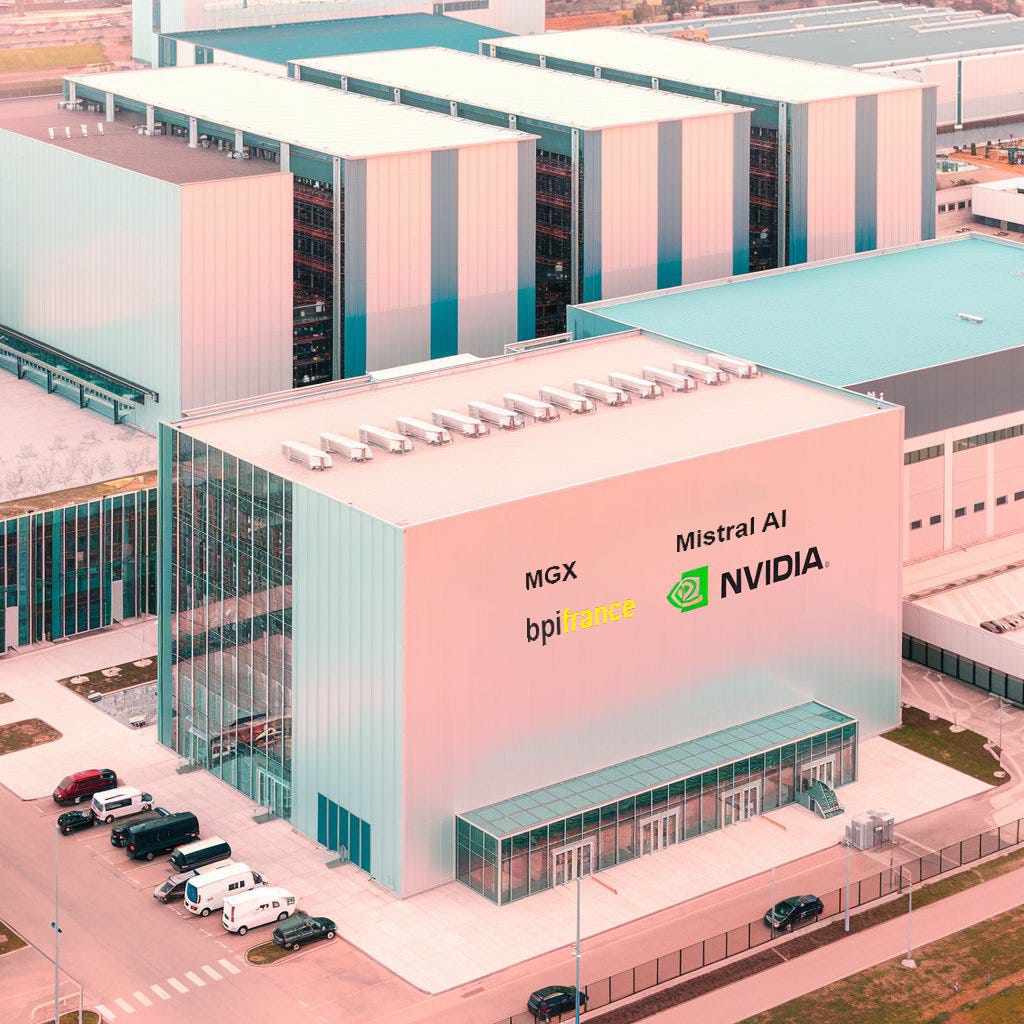France’s $8.5B AI Campus Is More Than Infrastructure. It’s Europe’s Sovereignty Playbook.
Welcome to Global Data Center Hub. Join 1000+ investors, operators, and innovators reading to stay ahead of the latest trends in the data center sector in developed and emerging markets globally.
A 1.4 GW, €8.5 billion AI megacampus is being built in the Paris region.
It’s backed by UAE capital, powered by French nuclear energy, fueled by NVIDIA chips, and shaped by Mistral AI’s open-source models.
But this isn’t just Europe’s largest AI infrastructure investment.
It’s a new strategic operating model, one that turns data centers into geopolitical assets and sovereign compute into national power.
Strategic Partnership Summary
At the 2025 Choose France Summit, a four-way joint venture was announced between:
MGX – Abu Dhabi’s $100 billion AI investment fund
Bpifrance – France’s national development bank
Mistral AI – A European leader in open-source foundation models
NVIDIA – The world’s dominant AI chipmaker
Their objective: construct Europe’s largest AI campus by 2028.
This facility will offer 1.4 gigawatts of compute-ready power, exascale computing capabilities, and full lifecycle support for AI model development and deployment.
Why This Project Matters
This is not just about bigger infrastructure. It is about building an independent AI stack from the ground up.
It offers an answer to three of Europe’s most pressing strategic questions:
Can we build competitive AI without relying on U.S. hyperscalers?
Can we align foreign investment with national priorities?
Can we make AI sustainable, open, and sovereign?
This campus says yes, by design.
A New Model for Strategic AI Infrastructure
What distinguishes this project is its structure. Each partner brings a unique advantage:
MGX provides long-term capital and geopolitical momentum from the UAE
Bpifrance aligns public policy, talent pipelines, and domestic ecosystem support
Mistral AI offers cutting-edge model architectures and European AI leadership
NVIDIA ensures the hardware backbone and software stack for global-scale compute
It is not a facility. It is an operating system for sovereign AI.
From Software-First to Infrastructure-First
Most countries approach AI development by focusing on regulation, ethics, or software innovation. France has flipped the sequence:
Secure energy and grid capacity
Build exascale infrastructure
Integrate sovereign cloud and model training systems
Support open research and commercial deployment
This infrastructure-first approach creates long-term resilience. It avoids the risks of over-dependence on foreign platforms and allows Europe to anchor AI innovation on European soil.
Campus Specifications
The campus will include:
1.4 GW power capacity, supported by France’s nuclear grid
Exascale compute infrastructure (at least 1 quintillion calculations per second)
Sovereign cloud integration for data residency and compliance
Full AI lifecycle support, from training to inference to deployment
Integration with École Polytechnique, EDF, Bouygues, and other national champions
By 2028, the facility will be operational and ready to support everything from industrial AI and robotics to large language model training and real-time inference.
Timeline
2025: JV announced at Choose France Summit
2026: Construction begins
2028: Facility goes live
Post-2028: Ecosystem scaling, regional expansion, and commercial integration
Strategic Benefits
For Europe
This campus offers a roadmap for AI sovereignty, not just policy rhetoric but physical infrastructure. It creates the conditions for:
Trusted cloud services built in Europe
Competitive model development by European teams
Clean, scalable energy for AI workloads
Alignment with climate, industrial, and digital policy goals
For Global Investors
It introduces a new class of infrastructure asset: AI-native, clean-powered, full-stack campuses.
This could become the blueprint for future AI hubs in other OECD countries—and even beyond.
For Founders and Researchers
It provides access to exascale computing, high-speed fiber, sovereign cloud environments, and integrated academic partnerships. No need to outsource compute or storage to non-EU platforms.
What This Means for AI Infrastructure Globally
France is doing what other governments have hesitated to do: treat AI infrastructure as a strategic asset class.
Not just because AI needs compute, but because compute defines control.
Whoever builds the rails of AI—power, chips, data centers, sovereign cloud—controls the pace, direction, and values of the next industrial revolution.
This campus sends a clear message: Europe can build its own rails.
What Comes Next
France may have just created a new playbook—one that other nations, especially in Asia, Africa, and Latin America, will study closely.
Key takeaways from the model:
Use domestic energy policy as leverage
Invite strategic capital, not just venture capital
Build infrastructure as a long-term asset, not a speculative bet
Anchor AI development in values of openness, collaboration, and sustainability
Final Thought
In a world where models evolve monthly, infrastructure evolves in decades.
This campus gives France, and Europe, a durable edge.
And in the age of artificial intelligence, durability is power.
One More Thing
I publish daily on data center investing, AI infrastructure, and the trends reshaping global data center markets.
Join 1000+ investors, operators, and innovators getting fresh insights every day and upgrade anytime to unlock premium research trusted by leading investors and developers.


I have really mixed feelings about this announcement. France is the decarbonized powerhouse of Europe. However, the electricity price is regulated by the EU. It could be much cheaper if it wasn't.
Over the past few years, the retail electricity rate has increased by 30% causing struggles for households and many SMEs went bankrupted.
Retail electricity rate, as it stands now, does not enable France to be an attractive destination for AI datacenters. The government had to come up with special rates combined with tax wavering to convince private companies to invest in France. The signal that it sends to the French population is terrible. I am a big advocate for digital sovereignty, but I cannot help finding this situation totally unfair. Macron had the opportunity to revisit / renegotiate the electricity rate for everyone, but he decided to cut corners to please a few.